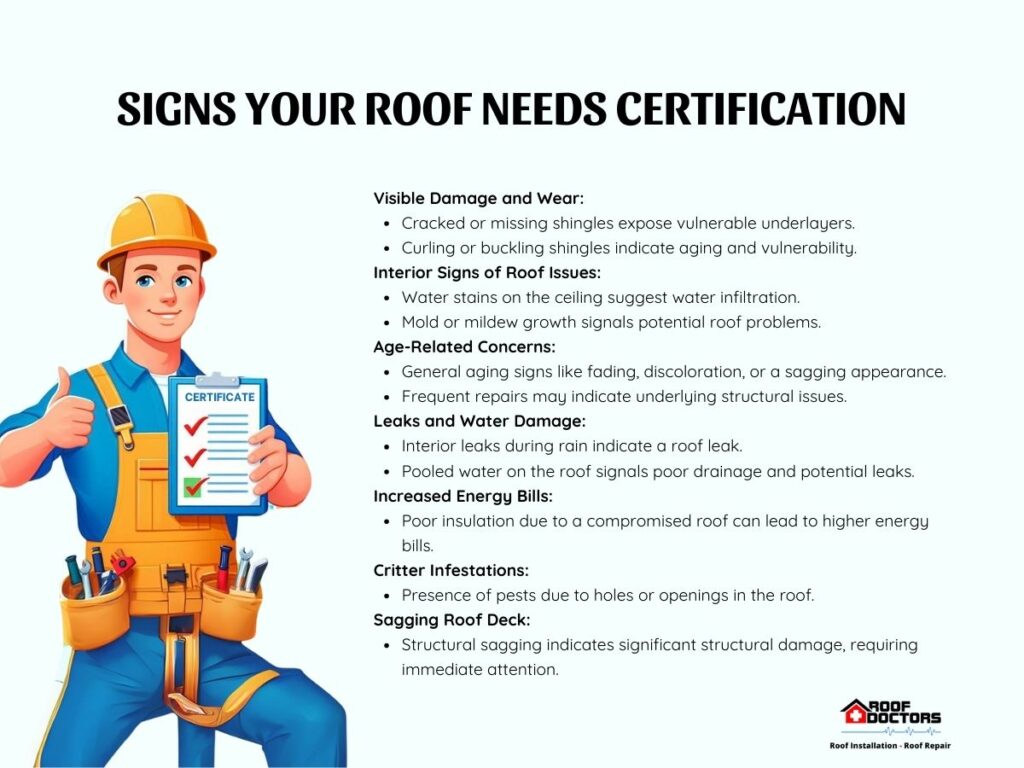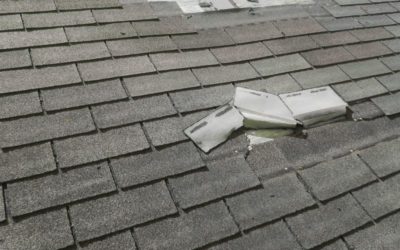In the hustle and bustle of daily life, it’s easy to overlook the importance of roof maintenance. After all, when was the last time you considered the condition of your roof beyond a passing thought? So, how often should your roof be certified?
In this blog, we’ll delve into this critical question. Join us as we unravel the mysteries of roof certification, exploring the factors that influence its frequency and the benefits it brings to your home and peace of mind.
Whether you’re a seasoned homeowner or a first-time buyer, this guide will shed light on the crucial aspects of roof care, helping you make informed decisions about your home’s most protective asset. Let’s embark on a journey through the skies – and the shingles – to discover the secrets of a certified roof.
What is Roof Certification?
Roof certification involves a thorough inspection to evaluate the structural integrity and overall condition of a roof. It goes beyond simple visual assessments, incorporating key components that contribute to a roof’s functionality and longevity.
This certification process is essential for homeowners seeking assurance that their roofs can withstand the test of time and environmental challenges.
Key Components Assessed During a Roof Certification
During a roof certification, various critical elements are scrutinized. This includes the examination of roofing materials, flashing, gutters, and ventilation systems.
Each of these components plays a vital role in the overall performance of the roof, and their proper functioning is necessary for a certified status.
Importance of Adhering to Local Building Codes and Regulations
Adherence to local building codes and regulations ensures that the roof meets the required safety and structural standards. Non-compliance not only jeopardizes the occupants’ safety but may also lead to legal consequences.
Therefore, obtaining a roof certification that aligns with these codes is not only responsible but also a legal necessity.
Factors Influencing the Frequency of Roof Certification
The frequency of roof certification is not universally standardized. Different factors determine the appropriate intervals for certifying a roof.
- Climate and Weather Conditions: The impact of extreme weather on roof integrity cannot be overstated. Homes in regions prone to specific weather challenges, such as hurricanes or snowstorms, may require more frequent certifications to ensure continuous protection against the elements.
- Age and Type of Roofing Material: Different roofing materials have varied maintenance needs. Asphalt shingles, metal, and tile each come with their unique set of considerations. Understanding the lifespan of these materials is crucial in determining the optimal certification frequency for your roof.
- Previous Maintenance and Repairs: Regular maintenance is a key player in extending a roof’s lifespan. However, the frequency of certifications may be influenced by the history of repairs and maintenance. A roof that has undergone frequent repairs may necessitate more regular certifications to ensure sustained reliability.
Signs Your Roof Needs Certification
Your roof undergoes wear and tear over time. Recognizing when it needs professional attention through certification is crucial for maintaining a secure and durable living space. Here are key signs that indicate your roof is due for certification:

Visible Damage and Wear
- Cracked or Missing Shingles: Shingles are the outermost layer of defense for your roof. Cracks or missing shingles expose the vulnerable underlayers to the elements, increasing the risk of leaks.
- Curling or Buckling Shingles: Shingles that no longer lay flat are a sign of aging and vulnerability. They may not effectively repel water and can compromise your roof’s integrity.
Interior Signs of Roof Issues
- Water Stains on the Ceiling: Water stains suggest that water is infiltrating your roof and making its way into your home. Prompt action is necessary to prevent further damage.
- Mold or Mildew Growth: Excessive moisture, often due to leaks, can lead to mold or mildew growth. Apart from compromising indoor air quality, it signals potential roof issues.
Age-Related Concerns
- General Aging Signs: As a roof age, it may exhibit signs like fading, discoloration, or a sagging appearance. These are indicators that the materials are reaching the end of their lifespan.
- Frequent Repairs: A history of frequent repairs might indicate underlying structural issues. While repairs are essential, their recurrence may necessitate a thorough certification.
Leaks and Water Damage
- Interior Leaks: Water dripping inside your home during rain is an obvious sign of a roof leak. Addressing leaks promptly can prevent extensive water damage to your property.
- Water Accumulation on the Roof: Pooled water on the roof indicates poor drainage, which can lead to leaks. Proper drainage is vital for a healthy roof.
Increased Energy Bills
- Poor Insulation: A compromised roof can lead to inadequate insulation, causing your HVAC system to work harder to regulate indoor temperatures. If you notice a sudden increase in energy bills, it might be time to inspect your roof.
Critter Infestations
- Presence of Pests: Holes or openings in your roof provide an entry point for pests. An increase in critter activity may signify vulnerabilities in your roof’s structure.
Sagging Roof Deck
- Structural Sagging: A visibly sagging roof deck can indicate structural damage. This requires immediate attention, as a compromised structure poses a significant risk.
General Guidelines for Roof Certification Frequency
Roofs are subjected to various environmental factors that can impact their integrity over time. To ensure your roof remains in optimal condition, adhere to the following general guidelines for certification frequency:
Annual Inspections for Preventive Maintenance
- Annual Inspections: Scheduling annual roof inspections is a proactive measure for identifying and addressing potential issues before they escalate.
- Routine Checks: Routine checks help maintain the overall health of your roof and prevent small problems from turning into costly repairs.
More Frequent Certifications for Older Roofs or Those in Harsh Climates
- Frequent Certificationss: Older roofs and those exposed to harsh weather conditions may require more frequent certifications.
- Certification Schedule: Tailor your certification schedule based on your roof’s age and the specific challenges posed by your local climate.
Customizing Certification Schedules
Recognizing that one size does not fit all, customizing certification schedules is essential for ensuring the specific needs of your roof are met:
Tailoring Certifications Based on Specific Conditions
- Evaluate Conditions: Evaluate the unique conditions your roof faces, such as heavy rainfall, extreme temperatures, or high winds.
- Adjust Frequency: Adjust the certification frequency to address the specific challenges posed by your environment.
Working with a Professional to Determine the Optimal Frequency
- Work with a Professional: Collaborate with a roofing professional to assess your roof’s condition and determine the most suitable certification schedule.
- Valuable Insights: Professional expertise can provide valuable insights into the specific requirements of your roof.
The Benefits of Regular Roof Certifications
Regular roof certifications offer a range of benefits that go beyond the immediate advantages of identifying issues. Consider the following advantages:

Cost Savings Through Early Detection of Issues
- Early Identification: Early identification of roof issues through certifications can save you money by addressing problems before they become extensive.
- Timely Repairs: Timely repairs prevent the need for costly replacements, ultimately preserving your budget.
Extending the Lifespan of Your Roof
- Mainteinance: Proactive maintenance, facilitated by regular certifications, can significantly extend the lifespan of your roof.
- Longevity of Your Roof: Prolonging the longevity of your roof is not only cost-effective but also contributes to the overall structural integrity of your home.
Ensuring Compliance with Insurance Requirements
- Roof Inspections: Many insurance policies require regular roof certifications as part of their terms.
- Certification Schedules: Adhering to certification schedules ensures compliance, preventing potential issues with insurance claims in the event of damage.
DIY Roof Inspections vs. Professional Certification
Choosing between DIY inspections and professional certification depends on various factors. Understanding the value each option provides is crucial:
Simple Maintenance Tasks Homeowners Can Perform
- Mainteinance Tasks: Homeowners can engage in simple maintenance tasks such as cleaning gutters, removing debris, and inspecting visible areas of the roof.
- DIY Efforts: DIY efforts contribute to the overall care of your roof and can be incorporated into a regular maintenance routine.
The Value of Professional Inspections
- Professional Inspections: Professional roof inspections involve in-depth assessments by experienced individuals.
- Knowledge Expertise: Roofing professionals possess the knowledge to identify subtle issues that may go unnoticed during DIY inspections.
Combining DIY Efforts with Professional Expertise
The most effective approach involves a combination of homeowner diligence and professional expertise. Regular DIY inspections complemented by periodic professional certifications create a comprehensive strategy for roof maintenance.
Conclusion
In the realm of homeownership, the often-neglected hero above—the roof—demands attention and care. As we’ve navigated through the importance of roof certification, its key components, and factors influencing its frequency, one truth emerges: a certified roof is not just a symbol of security but a wise investment.
Regular certifications, whether annually or more frequently tailored, offer the assurance of cost savings, extended roof lifespan, and compliance with safety standards. Whether you opt for DIY inspections or enlist professional expertise, the synergy of both ensures a resilient shield over your home. Remember, a certified roof today ensures peace of mind tomorrow.


